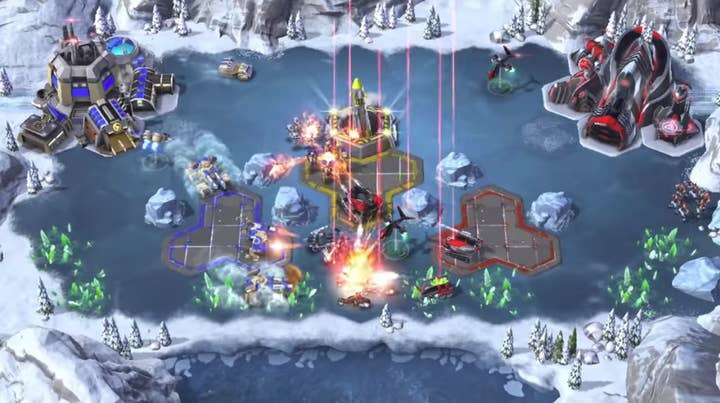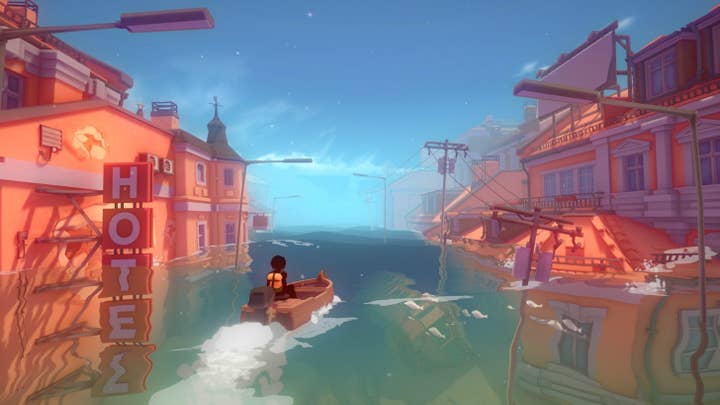"People make the mistake of saying, 'This is what you really want'"
EA chief design officer Patrick Söderlund talks about bringing back Command & Conquer as a mobile game and what the publisher really gets out of EA Originals
This is the second part of our interview with EA chief design officer Patrick Söderlund conducted at EA Play during the week of E3. The first part, in which he discussed EA's current thinking around loot boxes and its future ambitions for streaming, can be found here.
Over the last few years, the industry has seen a pattern pop up when publishers are introducing new variations on their big franchises.
When Bethesda revealed the mobile game Fallout Shelter, it did so at the same E3 briefing it took the wraps off Fallout 4. At this year's E3 when it showed off The Elder Scrolls: Blades for mobile, it followed that up shortly with confirmation an announcement of The Elder Scrolls VI, even though that game is years away from release. Microsoft doubled down on that approach for its own show this year, announcing two Gears of War spin-offs in quick succession--the Funko Pop-branded mobile title Gears Pop and the XCOM-like Gears Tactics--before confirming that it is also working on Gears 5.
In short, a spoonful of sugar makes the medicine go down. You announce the audience-building brand extension for a beloved series when you can also assure hardcore fans that a proper sequel is on the way.
Electronic Arts took a different angle this year with the reveal of Command & Conquer: Rivals at its pre-E3 EA Play event, revealing a mobile-exclusive variant of the real-time strategy series with no traditional C&C game in the wings. Speaking with EA chief design officer Patrick Söderlund at EA Play, we asked about the decision to revive the dormant brand with a mobile spin-off instead of the game fans really want.

"For us, I think people make the mistake of saying, 'This is what you really want,'" Soderlund said. "Mobile is the biggest gaming platform on the planet today. When the team came up with the construct of the game and we realized that there was a great fit for the C&C brand and we could make the game better as a result, that just felt like the next natural step. RTS games are still relevant in the market and for the most part PC-based, but if you can get a successful multiplayer, competitive-type RTS game to work well on mobile, we believe that could reach hundreds of millions of players in the world. That's what motivates us to do it.
"We're going to come to a point where we need to respect mobile games as much as console games"
"We believe this is a modern, contemporary interpretation of the Command & Conquer brand, but I think [mobile's] scale--not only across age but across gender--made this the natural platform for it. We're going to come to a point where we need to respect mobile games as much as console games. I know that's difficult to see when you come to E3, but our mobile business is growing quite significantly, and we look at those teams with the same value and the same integrity as we look at our console teams. And we believe this is the best interpretation we can do of the brand right now."
That raises the question of where the real value of a brand lies. Is Command & Conquer valuable because it has a core fandom that cares deeply about what happens with the franchise, or simply because it has been around long enough that it will have some name recognition with the more casual audiences EA is trying to reach with the mobile game?
"I think it's a little bit of both," Soderlund said. "When we started looking at this, we said OK, the Command & Conquer brand brings an IP that makes a game more interesting with the factions, the economy in there, and everything people relate to. It's also hopefully a flirt with people like you and I who grew up playing Red Alert and all these games. It feels familiar, like this is back in a relevant way. And when you have a catalog of properties like we do, sometimes it makes sense to resurrect them, and sometimes it doesn't. In this particular instance, with the game design the team had? The Command & Conquer brand just fit."
With its real-time multiplayer action and midcore appeal, Rivals seems like a departure from EA's previous mobile efforts like The Simpsons: Tapped Out and Star Wars: Galaxy of Heroes. And while Rivals got significant stage time during the EA Play conference and those other games were essentially absent, Soderlund cautioned against reading anything into that, saying Galaxy of Heroes has been a tremendous success and "we're treating that right now like we would treat a well-functioning live service on console, but times five."
As for the mobile move to midcore and real-time multiplayer games in general, Soderlund has of course seen that trend develop.
"Game designs on mobile are starting to mimic more and more what we deem to be console-based," he said. "The work Epic has done with Fortnite... I didn't think that would work, to be honest. I was super skeptical, yet I see my daughters playing it on their mobile phones while I play on my PS4 or Xbox or PC. I think they've shown the world that's possible. You can replicate a high-definition game onto a mobile phone and that works. The fact you can play against each other is also cool.
"The other trend we'll see is games on these devices used to be relatively shallow and simplistic, where it felt like they were free so everything was there so you could start paying money. I think we're seeing more sophisticated, deeper game designs. We're seeing more sophisticated and deeper fidelity. And I think we're going to see games that mimic what we see on the console side far more on these platforms long term, because they're powerful enough now."
Mobile gaming is standing in front of a gigantic shift, Soderlund said. The mobile audience has gender parity and spans virtually the entire planet, whereas there are still huge markets like India where the console business is essentially non-existent.
"It also spans across age unlike anything else," Soderlund said of mobile gaming. "It grows in so many vectors, which makes it very attractive to us."
Of course, that doesn't mean the console market can't expand its own audience a bit, and EA is working on that front as well. Its EA Originals program can be seen as one part of that effort, as the company works with developers it traditionally might not have in order to produce games one might not expect from a AAA publisher.
One of the key aspects of EA Originals is how little the company stands to directly benefit from these games. EA fronts the money for development, and once it recoups that, all additional revenue goes to the partner studio that created the game. That studio also gets to keep the intellectual property rights for whatever it creates, and even has creative control over the project. Each project does have a maximum budget, and developers are only eligible to participate in the program once.

The closest thing EA can get to a home run with EA Originals seems to be first dibs on a second title from the developer of a breakout hit. When asked if EA gets right of first refusal on future projects from EA Originals studios, Soderlund said, "We do have a clause for working with them in the future, yes."
So far the program has a decent track record. Coldwood Studios' Unravel technically predated the EA Originals program, but its success helped inspire EA to formalize this method of working with indies. EA Originals has produced three titles so far, Zoink's platformer Fe, Hazelight's co-op prison escape game A Way Out, and Coldwood's just-launched Unravel 2.
All of the games launched this year, and A Way Out has already recouped its money. But even if EA Originals had a string of misses, Soderlund said the maximum budget condition keeps potential losses manageable and make the program "more sustainable." And that means a game's ability to recoup the initial development cost doesn't need to be a primary concern when picking titles for the program.
"We have to be very clear with the fact that for some of these games we pick, they're not picked because they're the most mass market products," Soderlund said. "And I think that's the beauty of the program. We want to get these games into the hands of players because they have a deeper meaning than just being a mass market play. I think A Way Out is a mass market play, but that's not why we picked it. We picked it because of the unique idea of a co-op only game, we liked Josef [Farres], we liked the story, and we liked his ideas. His execution and the work his team did made players love it... It shows the program can bear fruit and it can work, and I think the next game they're going to build will be a much, much bigger, more ambitious game with far deeper funding."
The next project for EA Originals is Jo-Mei's Sea of Solitude, a game about young woman's traversing a flooded city as her loneliness turns her into a monster. Scheduled for release early next year, the game is one Soderlund says "may not feel quite so mass market," but he believes it has the potential to be a hit regardless.
